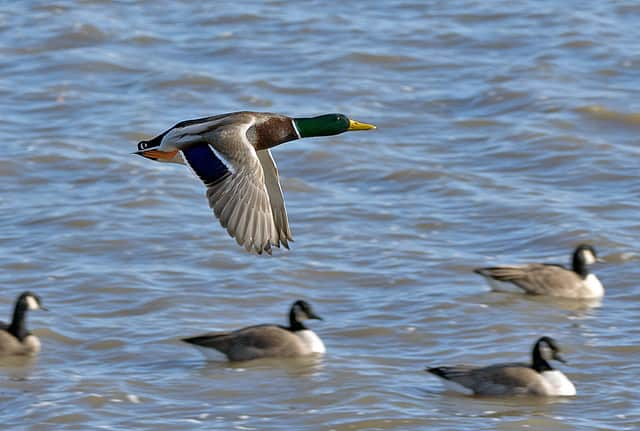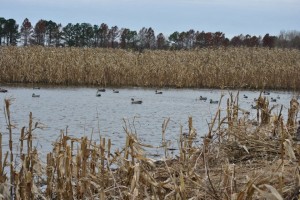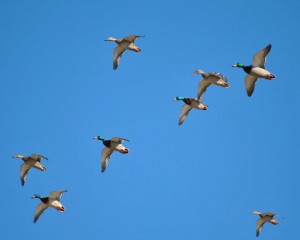Off-season Tips for Improving Duck Hunting Success
Fowled Reality 07.09.12

How your duck, goose and, if you take part, snow goose seasons are going will most likely decide how bad you may or may not want the season to end. Regardless of the aforementioned scenarios, there’s always an off-season. For us in Illinois, this particular time happens between the middle of March, after the last push of snow geese head north, to September 1, when early Teal and Canada goose seasons come back in. Those five or so months between the seasons can make or break how your next season will go. As a group of perpetual freelance hunters, it is becoming harder every year to be successful and the off-season is where preparing for the next season plays a HUGE role in our success.
Just because you can’t go duck hunting for another five months or so, does not mean you shouldn’t be preparing for the next season. Here is a list of activities the Fowled Reality team does to pass the long off-season months and better prepare us for the upcoming season.
 1. Cleaning Decoys
1. Cleaning Decoys
After a long season of hunting in the varied weather conditions duck hunting will throw your way, your decoys are bound to be covered in mud; I know ours were! As tedious as cleaning decoys may sound, it’s an imperative step to assuring a better chance at getting birds to light in your spread, or, as the duck hunting legend Jim Ronquest says, “[P]ut their boots on.”
To clean your decoys, it can be as simple as spraying them off with the water hose and wiping them off with a towel. It’s recommended that you DO NOT use soap when cleaning your decoys as this can leave a shine on the finish. After your decoys have dried off, be sure to carefully store them in a good decoy bag in a dry area. If you don’t store them in a good decoy bag, you will probably have to rinse them off again because of dust accumulation. You’ve most likely spent a lot of money on your decoys, so you may as well make sure you take care of them. By following these steps, you’ll have fresh looking decoys and save yourself a lot of money in the future.
2. Gun Maintenance and Cleaning
There’s nothing worse than going out on opening morning, shouldering your gun to take your first duck or goose of the season and pulling the trigger just to hear your gun “click,” or having your gun fail to cycle for a follow-up shot. Chances are, you have also spent a lot of money on your prized duck hunting gun, and they need a little TLC after a long, hard and grueling season. Take your gun apart, scrub it clean of residue buildup in your trigger mechanism, action, chamber and barrel. You will need to lightly oil the metal and moving parts of the gun to prevent rust and to ensure a smooth operating gun on that first pull of the trigger on your duck hunting opener.
3. Practice Shooting
Not all of us have the uncanny ability to pick up our guns on day one and shoot perfectly like shooting champion Tom Knapp. Unless you think you offer Tom Knapp a good challenge at shooting, it is recommended that you practice during the off-season by shooting some clays. Granted, clay birds aren’t going to be presented similar to how a duck lands, but getting a group of friends together to shoot trap, skeet or sporting clays will go a long way on your duck hunting days. Shooting clays will give you more practice on leading birds and following through on your shot.
 4. Private Land Duck Hunting
4. Private Land Duck Hunting
Landowners play an absolutely critical role in successful freelance duck hunting. Without them and their willingness to allow duck hunting, us freelancers would be left to state owned ground like Rend Lake or Pyramid State Park, which can often be overcrowded and divvy up staked hunting areas by a daily lottery draw. Be sure to thank your land owners for the opportunity to duck hunt their land. A common, and courteous, thing to do is offer them some of the meat from birds you harvest. If the landowner is the farmer as well, offer to help out on the farm a weekend or two.
Some may call me crazy, but farmers are reluctant to allow hunting. They’re often afraid of potential liability lawsuits if someone were to get hurt on their property, and rightfully so. If you’re really serious about it, you can even have a liability waiver drawn up and signed to ensure that the landowner is protected in the unfortunate event someone does get hurt on their property. The off-season is also the perfect time to introduce yourself to other farmers/landowners of properties you would like to duck hunt, in particular during planting and harvesting seasons. As states are short on cash, particularly our home state of Illinois, which prohibits them from maintaining duck hunting ground with the right amount of food sources and rest areas, landowners are saviors to us freelance duck hunters.
5. Practice Your Duck Calls
Duck hunting offers a unique experience that not many other types of hunting can. Duck hunting is dependent upon your ability to convince a duck, or a group of ducks, that your fake ducks are making inviting and realistic duck sounds that coerce them to come on down and hang out. The level of deceit achieved during a successful trip amazes me every time and is part of what keeps me coming back every season. A critical piece of the deceitful puzzle is the ability to sound like a duck. I haven’t met a single duck hunter that picked up a duck call on day one and sounded like Hunter Grounds or Chad Belding, so practice is necessary, just ask them and they’ll say the same thing. It is critical to successful duck hunting to practice your duck calling skills and the offseason is the perfect time to do it. I drive 30 minutes each way to and from work, so this is when I practice on my duck calls (and it drives my fiancé absolutely crazy when I do it at the house and she’s home). I’m not saying you need to practice for hours every day, but pick 10 to 15 minutes of your free time in the truck and you will become a better duck caller.
When it all boils down to it, there really is no off-season between duck hunting seasons as there are many things to do to help prepare you for a successful next season. Follow these often-overlooked tips during the metaphorical offseason and your hard work is bound to pay off with more successful duck hunting days in the blind.



